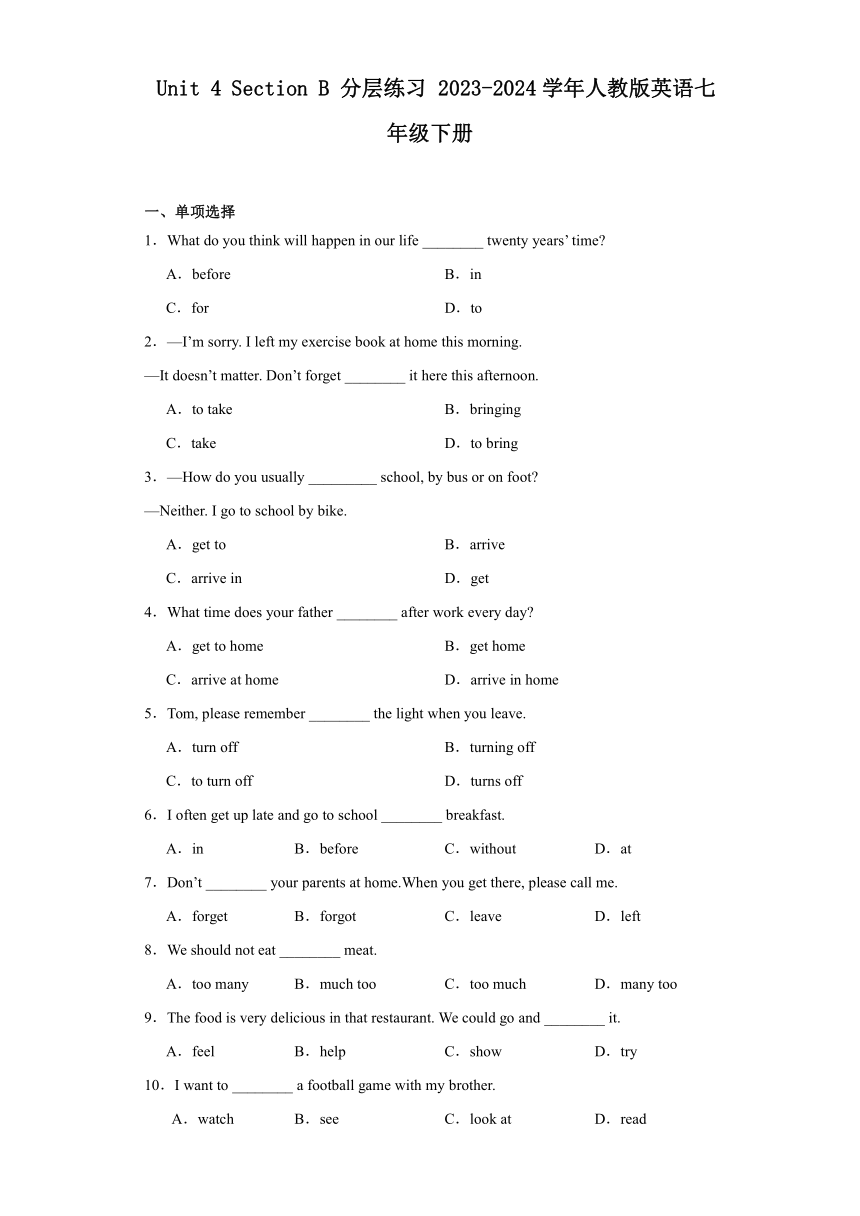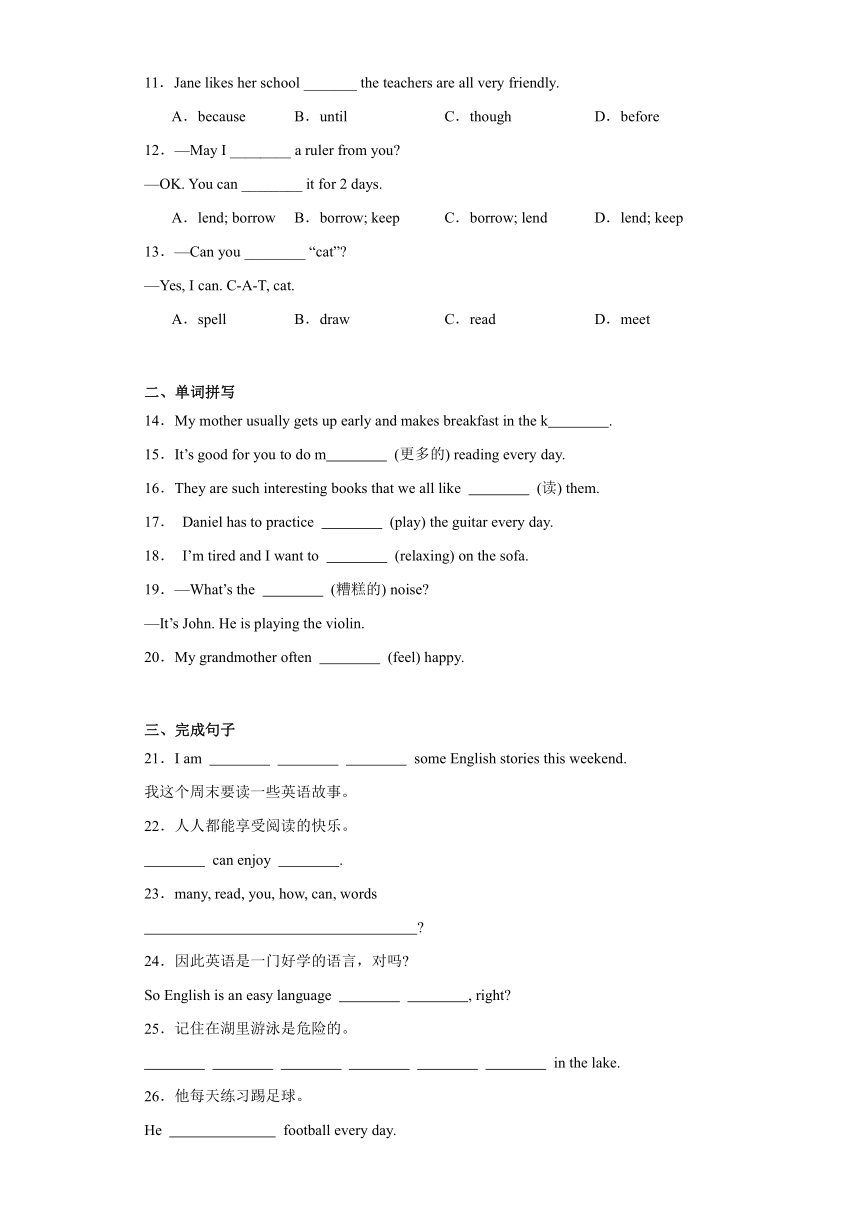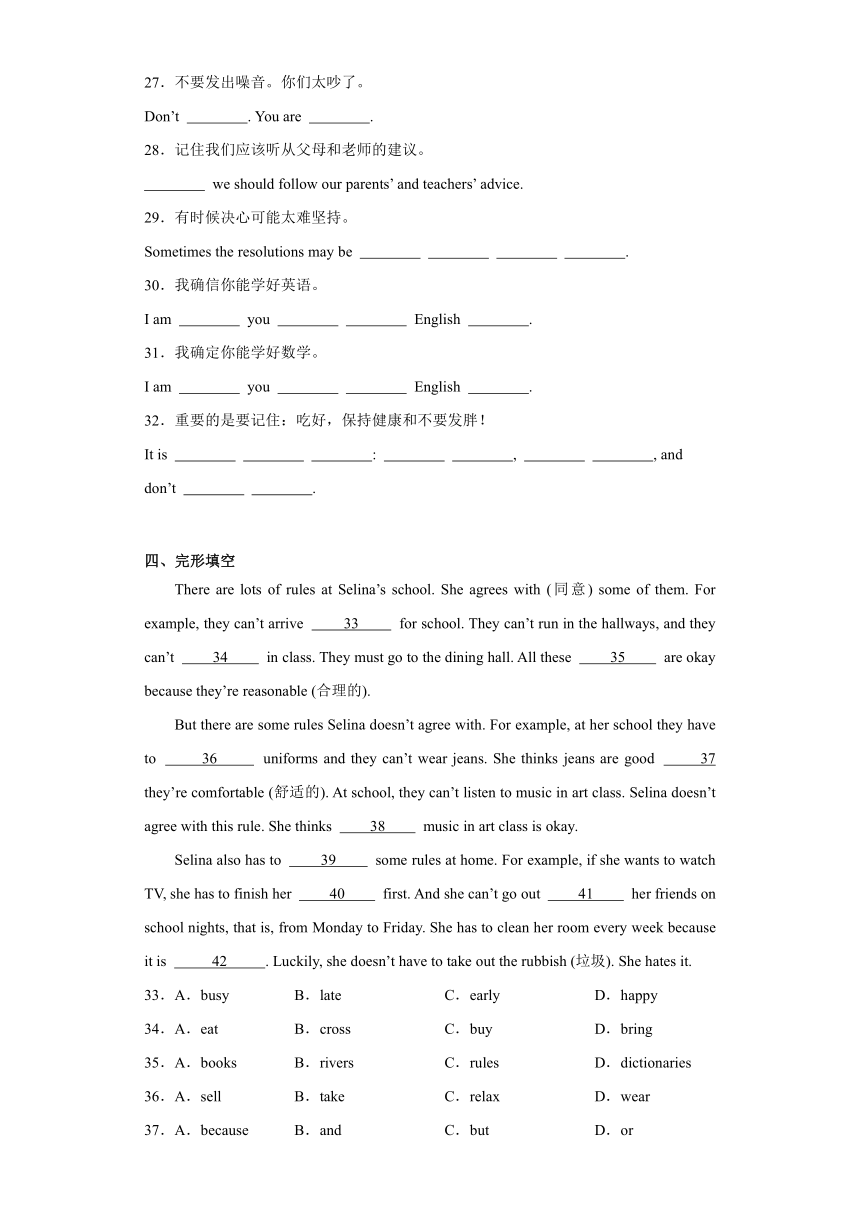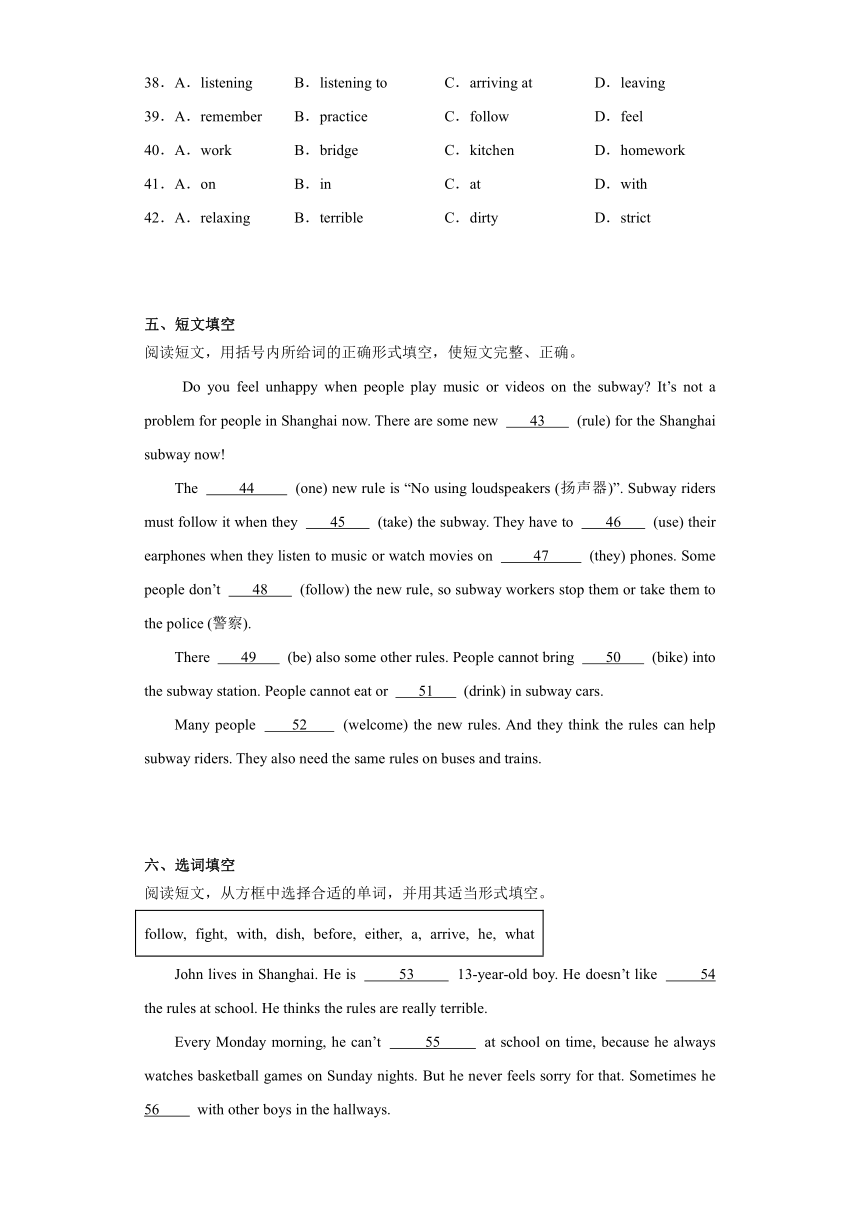Unit 4 Don't eat in class. Section B 分层练习(含解析) 2023-2024学年人教版英语七年级下册
文档属性
| 名称 | Unit 4 Don't eat in class. Section B 分层练习(含解析) 2023-2024学年人教版英语七年级下册 |

|
|
| 格式 | docx | ||
| 文件大小 | 34.2KB | ||
| 资源类型 | 教案 | ||
| 版本资源 | 人教新目标(Go for it)版 | ||
| 科目 | 英语 | ||
| 更新时间 | 2024-04-08 00:00:00 | ||
图片预览





文档简介
Unit 4 Section B 分层练习 2023-2024学年人教版英语七年级下册
一、单项选择
1.What do you think will happen in our life ________ twenty years’ time
A.before B.in
C.for D.to
2.—I’m sorry. I left my exercise book at home this morning.
—It doesn’t matter. Don’t forget ________ it here this afternoon.
A.to take B.bringing
C.take D.to bring
3.—How do you usually _________ school, by bus or on foot
—Neither. I go to school by bike.
A.get to B.arrive
C.arrive in D.get
4.What time does your father ________ after work every day
A.get to home B.get home
C.arrive at home D.arrive in home
5.Tom, please remember ________ the light when you leave.
A.turn off B.turning off
C.to turn off D.turns off
6.I often get up late and go to school ________ breakfast.
A.in B.before C.without D.at
7.Don’t ________ your parents at home.When you get there, please call me.
A.forget B.forgot C.leave D.left
8.We should not eat ________ meat.
A.too many B.much too C.too much D.many too
9.The food is very delicious in that restaurant. We could go and ________ it.
A.feel B.help C.show D.try
10.I want to ________ a football game with my brother.
A.watch B.see C.look at D.read
11.Jane likes her school _______ the teachers are all very friendly.
A.because B.until C.though D.before
12.—May I ________ a ruler from you
—OK. You can ________ it for 2 days.
A.lend; borrow B.borrow; keep C.borrow; lend D.lend; keep
13.—Can you ________ “cat”
—Yes, I can. C-A-T, cat.
A.spell B.draw C.read D.meet
二、单词拼写
14.My mother usually gets up early and makes breakfast in the k .
15.It’s good for you to do m (更多的) reading every day.
16.They are such interesting books that we all like (读) them.
17. Daniel has to practice (play) the guitar every day.
18. I’m tired and I want to (relaxing) on the sofa.
19.—What’s the (糟糕的) noise
—It’s John. He is playing the violin.
20.My grandmother often (feel) happy.
三、完成句子
21.I am some English stories this weekend.
我这个周末要读一些英语故事。
22.人人都能享受阅读的快乐。
can enjoy .
23.many, read, you, how, can, words
24.因此英语是一门好学的语言,对吗
So English is an easy language , right
25.记住在湖里游泳是危险的。
in the lake.
26.他每天练习踢足球。
He football every day.
27.不要发出噪音。你们太吵了。
Don’t . You are .
28.记住我们应该听从父母和老师的建议。
we should follow our parents’ and teachers’ advice.
29.有时候决心可能太难坚持。
Sometimes the resolutions may be .
30.我确信你能学好英语。
I am you English .
31.我确定你能学好数学。
I am you English .
32.重要的是要记住:吃好,保持健康和不要发胖!
It is : , , and don’t .
四、完形填空
There are lots of rules at Selina’s school. She agrees with (同意) some of them. For example, they can’t arrive 33 for school. They can’t run in the hallways, and they can’t 34 in class. They must go to the dining hall. All these 35 are okay because they’re reasonable (合理的).
But there are some rules Selina doesn’t agree with. For example, at her school they have to 36 uniforms and they can’t wear jeans. She thinks jeans are good 37 they’re comfortable (舒适的). At school, they can’t listen to music in art class. Selina doesn’t agree with this rule. She thinks 38 music in art class is okay.
Selina also has to 39 some rules at home. For example, if she wants to watch TV, she has to finish her 40 first. And she can’t go out 41 her friends on school nights, that is, from Monday to Friday. She has to clean her room every week because it is 42 . Luckily, she doesn’t have to take out the rubbish (垃圾). She hates it.
33.A.busy B.late C.early D.happy
34.A.eat B.cross C.buy D.bring
35.A.books B.rivers C.rules D.dictionaries
36.A.sell B.take C.relax D.wear
37.A.because B.and C.but D.or
38.A.listening B.listening to C.arriving at D.leaving
39.A.remember B.practice C.follow D.feel
40.A.work B.bridge C.kitchen D.homework
41.A.on B.in C.at D.with
42.A.relaxing B.terrible C.dirty D.strict
五、短文填空
阅读短文,用括号内所给词的正确形式填空,使短文完整、正确。
Do you feel unhappy when people play music or videos on the subway It’s not a problem for people in Shanghai now. There are some new 43 (rule) for the Shanghai subway now!
The 44 (one) new rule is “No using loudspeakers (扬声器)”. Subway riders must follow it when they 45 (take) the subway. They have to 46 (use) their earphones when they listen to music or watch movies on 47 (they) phones. Some people don’t 48 (follow) the new rule, so subway workers stop them or take them to the police (警察).
There 49 (be) also some other rules. People cannot bring 50 (bike) into the subway station. People cannot eat or 51 (drink) in subway cars.
Many people 52 (welcome) the new rules. And they think the rules can help subway riders. They also need the same rules on buses and trains.
六、选词填空
阅读短文,从方框中选择合适的单词,并用其适当形式填空。
follow, fight, with, dish, before, either, a, arrive, he, what
John lives in Shanghai. He is 53 13-year-old boy. He doesn’t like 54 the rules at school. He thinks the rules are really terrible.
Every Monday morning, he can’t 55 at school on time, because he always watches basketball games on Sunday nights. But he never feels sorry for that. Sometimes he 56 with other boys in the hallways.
57 parents know he doesn’t behave (表现) well at school, so they are strict 58 him at home and make some rules for him. 59 are the rules He has to make his bed and do the 60 on weekends. And he must read for half an hour 61 going to bed. John doesn’t like his family rules, 62 . He wants to talk with his parents about the rules.
参考答案:
1.B
【详解】
句意:你认为二十年后我们的生活会发生什么?
考查时间介词。before在……之前;in在……以后;for一段时间;to关于。in+一段时间,表示“多久以后”,与一般将来时连用。故选B。
2.D
【详解】句意:——我很抱歉。我今天早晨把练习册落在家里了。——没关系。今天下午别忘了带到这来。
考查动词短语和动词辨析。forget to do sth忘了去做某事;forget doing sth忘了做过某事;take拿,表示带去(从这里带到另一个地方);bring带来,表示带来(从另一个地方带到这里)。根据“this afternoon.”可知此处指之后别忘了做某事,用不定式作宾语。根据here可知,此处指从别的地方带来。故选D。
3.A
【详解】句意:——你通常怎么去上去,坐公交还是步行?——都不是。我骑自行车去。
考查动词辨析。get to到达;arrive到达,不及物动词,后通常接in或at;arrive in到达大地点;get不及物动词。get和arrive是不及物动词,排除B和D。学校是小地点,排除C。故选A。
4.B
【详解】句意:你爸爸每天什么时候下班回家?
考查动词短语及地点副词。get到达;get to到达;arrive at到达,后接小地点;arrive in到达,后接大地点。home是地点副词,前面不加介词。故选B。
5.C
【详解】句意:Tom,请记住当你离开的时候,关了灯。
考查动词短语。remember to do sth表示“记得做某事”;remember doing sth表示“记得做过某事”,根据“the light when you leave.”可知此处指记得去做某事,用不定式作宾语。故选C。
6.C
【详解】句意:我经常起床很晚并且不吃早饭就去学校。
考查介词。in在……里;before在……前;without没有;at在。根据语境可知起床晚,后文应是不吃早饭就去上学。所以应是without“没有”。故选C。
7.C
【详解】句意:不要把你的父母留在家里。当你到那儿的时候,请给我打电话。
考查动词辨析及祈使句。该句为祈使句的否定句,谓语动词要用动词原形,故排除BD;forget忘记;leave留下。表示“把某物遗忘在某地”需用“leave sth.+地点”结构。故选C。
8.C
【详解】句意:我们不应该吃太多肉。
考查短语辨析。too many+名词复数,太多;much too+形容词/副词,太;too much+不可数名词,太多;D选项本身错误。这里表示不应该吃“太多”肉,meat是不可数名词。故选C。
9.D
【详解】句意:那家餐馆的食物非常美味。我们可以去试试。
考查动词词义辨析。feel感觉;help帮助;show展示;try品尝,尝试。根据语境“The food is very delicious in that restaurant.”可知,我们可以去“品尝”一下美味的食物。故选D。
10.A
【详解】句意:我想和我哥哥一起看足球赛。
考查动词辨析。watch观看;see看到;look at看;read阅读。根据“football game ”可知看足球赛应用watch,故选A。
11.A
【详解】句意:简喜欢她的学校,因为老师们都很友好。
考查连词辨析。because因为;until直到;though尽管;before在……以前。分析句子可知,空处前后是因果关系,应用because,故选A。
12.B
【详解】句意:——我可以借下你的直尺吗?——好的。你可以借用两天。
考查动词辨析。lend借出;borrow借入;keep保存。根据“May I ... a ruler from you ”可知,此处为我从你那里借入直尺,用borrow,故排除A和D;根据“for 2 days”可知,和时间段连用应用延续性动词,keep为延续性动词,lend为非延续动词。故选B。
13.A
【详解】句意:——你能拼写“猫”吗?——是的,我能。C-A-T,猫。
考查动词辨析。spell拼写;draw绘画;read读;meet遇见。根据“C-A-T”可知,此处指拼写单词。故选A。
14.(k)itchen
【详解】句意:我妈妈通常起得很早,在厨房做早餐。根据“My mother usually gets up early and makes breakfast”及所给的首字母提示可知,这里是在厨房做早餐,kitchen意为“厨房”,这里用单数。故填(k)itchen。
15.(m)ore
【详解】句意:每天多读书对你有好处。根据中文提示和首字母提示,可知more“更多的”,符合句意。故填(m)ore。
16.reading/to read
【详解】句意:它们是如此有趣的书,以至于我们所有人都喜欢读。read“读”,like doing sth/like to do sth“喜欢做某事”,所以设空处填写动名词或不定式形式作宾语。故填reading/to read。
17.playing
【详解】句意:丹尼尔每天必须练习弹吉他。practice doing sth.“练习做某事”,固定结构。故填playing。
18.relax
【详解】句意:我累了,我想在沙发上放松一下。want to do sth“想要做某事”,此空应填动词原形,relaxing是形容词,对应的动词是relax“使放松”,故填relax。
19.terrible
【详解】句意:——是什么可怕的噪音?——是约翰。他正在拉小提琴。根据中文提示可知,“糟糕的”的英文表述为terrible,形容词,作定语。故填terrible。
20.feels
【详解】句意:我的祖母经常感到快乐。根据“often”可知,句子应用一般现在时,主语是“My grandmother”,动词用三单形式,故填feels。
21. going to read
【详解】be going to do sth“要做某事”,read“阅读”,故填going;to;read。
22. Everyone/Everybody reading
【详解】“人人”的英文表达为“everyone或everybody”,因为是句子的开头单词,所以首字母要大写;“阅读”是“read”,enjoy后接doing,所以用“reading”。故填Everyone/Everybody;reading。
23.How many words can you read
【详解】根据所给标点及how many可知用特殊疑问句句式,其结构为:特殊疑问词+助动词/be动词/情态动词+主语+动词原形+其它?分析所给单词,how many words为特殊疑问词放在句首,you作主语,can作为情态动词,放在主语之前,read作为动词原形,放在句末。故答案为:How many words can you read “你会读多少个单词”。
24. to learn
【详解】根据题干提示,好学的:easy...to learn,应用动词不定式做后置定语。故填to;learn。
25. Remember it is dangerous to swim
【详解】根据中文提示可知,该句是祈使句,动词原形开头。“记住”翻译成remember;“在湖里游泳是危险的”作为“remember”的宾语从句。“做某事是……的”翻译成句型“it is+形容词+to do sth”;“危险的”翻译成dangerous;“游泳”翻译成swim,所以“在湖里游泳是危险的”翻译成“ it is dangerous to swim in the lake”。故填Remember;it;is;dangerous;to;swim。
26.practises playing/practices playing
【详解】根据语境可知,此处是每天发生的事情,所以要用一般现在时态,且主语是第三人称单数,所以谓语动词也要用三单形式,又因practice/practise意为“练习”,后面要用doing的形式。故填practises/practices;playing。
27. make noise too noisy
【详解】根据题干,发出噪音:make noise,在助动词后用动词原形;太吵:too noisy。故填make noise;too noisy。
28.Remember that
【详解】remember“记住”,分析句意可知,本句是祈使句,动词应用原形;remember后加that引导宾语从句。故填Remember that。
29. too difficult to keep
【详解】too...to...表示“太……而不能……”,是固定搭配;在这个结构中,要表示“太难而不能坚持”,用too表示“太”;too后面跟形容词,用difficult表示“难的”;表达“坚持”用单词keep,to后面跟动词原形,因此keep用原形。故填too;difficult;to;keep。
30. sure can learn well
【详解】be sure“确信”,can“能”,learn sth well“学好……”。故填sure;can;learn;well。
31. sure can learn well
【详解】sure意为“确定”,是形容词,be sure后可接句子;can是情态动词,意为“能,会”,后接动词原形,learn English意为“学英语”,well是副词,意为“好”,可修饰动词learn。故填sure;can;learn;well。
32. important to remember eat well keep healthy get fat
【详解】比较中英文意思,缺失内容为“重要的”,“记住”,吃好,“保持健康”以及“发胖”。important“重要的”,形容词;remember“记住”,动词;吃好“eat well”,保持健康“keep healthy”,发胖“get fat”,此处为祈使句,所以应用动词原形。It’s+adj.+to do sth.“做某事……”,所以此处应用动词不定式,即to remember。故填important;to;remember;eat;well;keep;healthy;get;fat。
33.B 34.A 35.C 36.D 37.A 38.B 39.C 40.D 41.D 42.C
【分析】文章讲述Selina的学校有很多的规则,有些规则很合情合理,她很赞同,但是有些规则她就不赞同。同时,她在家里也要遵守一些规则。
33.句意:例如,他们不能迟到。
busy忙碌的;late迟的;early早的;happy高兴的;根据“they can’t arrive”以及常识可知,学校规定学生不能“迟到”,故选B。
34.句意:他们不能在走廊里跑,不能在课堂上吃东西。
eat吃;cross穿过;buy买;bring带来。根据“They must go to the dining hall.”可知,课堂上不允许“吃”东西。故选A。
35.句意:所有这些规则都很好,因为它们是合理的。
books书;rivers河流;rules规则;dictionaries字典。根据“they can’t arrive … for school. They can’t run in the hallways, and they can’t … in class. ”可知,这些都是“规则”。故选C。
36.句意:例如,在她的学校,他们必须穿校服。
sell卖;take拿走;relax放松;wear穿。根据“they have to … uniforms”可知,此处指在学校得“穿”校服。故选D。
37.句意:她认为牛仔裤很好,因为它们很舒服。
because因为;and和;but但是;or或者。根据“She thinks jeans are good ”可知,她认为牛仔裤很好;再根据“they’re comfortable (舒适的).”可知,它们是舒适的;前后句是因果关系,应用because连接。故选A。
38.句意:她认为在美术课上听音乐是可以的。
listening听;listening to听……,后跟宾语;arriving at到达;leaving离开。根据“She thinks … music in art class is okay.”可知,此处指“听音乐”,应用listening to。故选B。
39.句意:Selina在家也要遵守一些规则。
remember记得;practice练习;follow遵守;feel触摸。根据“There are lots of rules at Selina’s school.”可知,上文陈述Selina在学校必须遵守的规章制度,这里说的是在家也必须“遵守”家规。故选C。
40.句意:她必须先完成作业。
work工作;bridge桥;kitchen厨房;homework家庭作业。根据“she has to finish her … first”可知,Selina是一名学生,看电视前先要完成“家庭作业”。故选D。
41.句意:在上学的晚上,她不能和她的朋友出去。
on在……上;in在……里;at在;with和。根据“she can’t go out … her friends on school nights”可知,此处指上学的晚上,不能和朋友外出。故选D。
42.句意:她不得不每周打扫她的房间,因为它很脏。
relaxing令人放松的;terrible糟糕的;dirty脏的;strict严格的。根据前面的“clean her room”可知,打扫是因为房间“脏”。故选C。
43.rules 44.first 45.take 46.use 47.their 48.follow 49.are 50.bikes 51.drink 52.welcome
【导语】本文介绍了在上海乘坐地铁的一些新规定。
43.句意:现在上海地铁有了一些新规定!根据句中“There are…”,可知空处应填可数名词rule的复数形式。故填rules。
44.句意:第一条新规则是“禁止使用扬声器”。根据空前定冠词“The”,可知空处应填基数词one对应的序数词first。故填first。
45.句意:地铁乘客乘坐地铁时必须遵循它。根据上下文,可知句子时态为一般现在时,主语是they,空处应填动词take的原形。故填take。
46.句意:当他们在手机上听音乐或看电影时,他们必须使用耳机。根据空前“have to”,可知后接动词原形。故填use。
47.句意:当他们在手机上听音乐或看电影时,他们必须使用耳机。根据空后名词“phones”,可知空处应填人称代词they对应的形容词性物主代词their。故填their。
48.句意:有些人不遵守新规定,所以地铁工作人员阻止他们或把他们带去警察那。根据空前“don’t”,可知空处应填动词原形。故填follow。
49.句意:还有一些其他的规则。根据空前“There”和括号内提示词,可知此句是there be句型,根据“rules”为名词复数,可知be动词应用are。故填are。
50.句意:人们不能把自行车带进地铁站。根据主语是“People”,结合语境,可知空处应填名词复数泛指一类事物。故填bikes。
51.句意:人们不能在地铁车厢里吃东西或喝东西。根据空前“cannot eat or”,可知空处也应填动词原形。故填drink。
52.句意:许多人欢迎新规定。根据主语是“Many people”,时态为一般现在时,谓语动词应用动词原形。故填welcome。
53.a 54.following 55.arrive 56.fights 57.His 58.with 59.What 60.dishes 61.before 62.either
【分析】本文主要谈论校规和家规。上海一个13岁的男孩John不喜欢在学校里遵守校规。他认为规章制度真的很糟糕。每个星期一早上,他都不能按时到达学校。有时他在走廊里和其他男孩打架。他的父母在家里对他很严格,并为他制定一些规则。他周末必须整理床铺和洗碗,在睡觉前阅读半小时。John也不喜欢他的家规。
53.句意:他是一个13岁的男孩。可数名词单数不可单独使用,前面一般跟不定冠词,表示泛指;13-year-old是辅音音素开头,结合所给词,故用不定冠词a。故填a。
54.句意:他不喜欢在学校里遵守校规。短语like doing sth表示“喜欢做某事”;结合所给词,follow the rules“遵守制度”。故填following。
55.句意:每个星期一早上,他都不能按时到达学校,因为他总是在星期天晚上看篮球比赛。情态动词can’t后面跟动词原形;结合所给词,到达学校用arrive;故填arrive。
56.句意:有时他在走廊里和其他男孩打架。根据频度副词Sometimes可知此句时态是一般现在时,主语三单可知谓语动词使用单数;结合所给词,fight“打架”。故填fights。
57.句意:他的父母知道他在学校表现不好,所以他们在家里对他很严格,并为他制定一些规则。形容词性物主代词修饰名词,此处修饰名词parents,可知填形容词性物主代词;结合所给词,he“他”,人称代词主格;它的形容词性物主代词是his;注意,句子开头要大写。故填His。
58.句意:他的父母知道他在学校表现不好,所以他们在家里对他很严格,并为他制定一些规则。此处需要填介词,结合所给词,短语be strict with sb“对某人严格要求”。故填with。
59.句意:规则是什么?根据下文“He has to make his bed ... going to bed.”介绍的是具体规则,可知此处是对规则的提问,结合所给词,选择what,注意,句子开头要大写。故填What。
60.句意:他周末必须整理床铺和洗碗。分析句子可知,此处需要填名词,结合所给词,短语do the dishes表示“洗碗”。故填dishes。
61.句意:他必须在睡觉前阅读半小时。分析句子可知,此处需要填介词,结合所给词,before“在……以前”。故填before。
62.句意:John也不喜欢他的家庭规则。根据上文“He doesn’t like ... the rules at school.”可知,此处表示也不喜欢家里的规则。结合所给词,too“也”,一般用于肯定句或疑问句,否定句用either;本句是否定句。故填either。
一、单项选择
1.What do you think will happen in our life ________ twenty years’ time
A.before B.in
C.for D.to
2.—I’m sorry. I left my exercise book at home this morning.
—It doesn’t matter. Don’t forget ________ it here this afternoon.
A.to take B.bringing
C.take D.to bring
3.—How do you usually _________ school, by bus or on foot
—Neither. I go to school by bike.
A.get to B.arrive
C.arrive in D.get
4.What time does your father ________ after work every day
A.get to home B.get home
C.arrive at home D.arrive in home
5.Tom, please remember ________ the light when you leave.
A.turn off B.turning off
C.to turn off D.turns off
6.I often get up late and go to school ________ breakfast.
A.in B.before C.without D.at
7.Don’t ________ your parents at home.When you get there, please call me.
A.forget B.forgot C.leave D.left
8.We should not eat ________ meat.
A.too many B.much too C.too much D.many too
9.The food is very delicious in that restaurant. We could go and ________ it.
A.feel B.help C.show D.try
10.I want to ________ a football game with my brother.
A.watch B.see C.look at D.read
11.Jane likes her school _______ the teachers are all very friendly.
A.because B.until C.though D.before
12.—May I ________ a ruler from you
—OK. You can ________ it for 2 days.
A.lend; borrow B.borrow; keep C.borrow; lend D.lend; keep
13.—Can you ________ “cat”
—Yes, I can. C-A-T, cat.
A.spell B.draw C.read D.meet
二、单词拼写
14.My mother usually gets up early and makes breakfast in the k .
15.It’s good for you to do m (更多的) reading every day.
16.They are such interesting books that we all like (读) them.
17. Daniel has to practice (play) the guitar every day.
18. I’m tired and I want to (relaxing) on the sofa.
19.—What’s the (糟糕的) noise
—It’s John. He is playing the violin.
20.My grandmother often (feel) happy.
三、完成句子
21.I am some English stories this weekend.
我这个周末要读一些英语故事。
22.人人都能享受阅读的快乐。
can enjoy .
23.many, read, you, how, can, words
24.因此英语是一门好学的语言,对吗
So English is an easy language , right
25.记住在湖里游泳是危险的。
in the lake.
26.他每天练习踢足球。
He football every day.
27.不要发出噪音。你们太吵了。
Don’t . You are .
28.记住我们应该听从父母和老师的建议。
we should follow our parents’ and teachers’ advice.
29.有时候决心可能太难坚持。
Sometimes the resolutions may be .
30.我确信你能学好英语。
I am you English .
31.我确定你能学好数学。
I am you English .
32.重要的是要记住:吃好,保持健康和不要发胖!
It is : , , and don’t .
四、完形填空
There are lots of rules at Selina’s school. She agrees with (同意) some of them. For example, they can’t arrive 33 for school. They can’t run in the hallways, and they can’t 34 in class. They must go to the dining hall. All these 35 are okay because they’re reasonable (合理的).
But there are some rules Selina doesn’t agree with. For example, at her school they have to 36 uniforms and they can’t wear jeans. She thinks jeans are good 37 they’re comfortable (舒适的). At school, they can’t listen to music in art class. Selina doesn’t agree with this rule. She thinks 38 music in art class is okay.
Selina also has to 39 some rules at home. For example, if she wants to watch TV, she has to finish her 40 first. And she can’t go out 41 her friends on school nights, that is, from Monday to Friday. She has to clean her room every week because it is 42 . Luckily, she doesn’t have to take out the rubbish (垃圾). She hates it.
33.A.busy B.late C.early D.happy
34.A.eat B.cross C.buy D.bring
35.A.books B.rivers C.rules D.dictionaries
36.A.sell B.take C.relax D.wear
37.A.because B.and C.but D.or
38.A.listening B.listening to C.arriving at D.leaving
39.A.remember B.practice C.follow D.feel
40.A.work B.bridge C.kitchen D.homework
41.A.on B.in C.at D.with
42.A.relaxing B.terrible C.dirty D.strict
五、短文填空
阅读短文,用括号内所给词的正确形式填空,使短文完整、正确。
Do you feel unhappy when people play music or videos on the subway It’s not a problem for people in Shanghai now. There are some new 43 (rule) for the Shanghai subway now!
The 44 (one) new rule is “No using loudspeakers (扬声器)”. Subway riders must follow it when they 45 (take) the subway. They have to 46 (use) their earphones when they listen to music or watch movies on 47 (they) phones. Some people don’t 48 (follow) the new rule, so subway workers stop them or take them to the police (警察).
There 49 (be) also some other rules. People cannot bring 50 (bike) into the subway station. People cannot eat or 51 (drink) in subway cars.
Many people 52 (welcome) the new rules. And they think the rules can help subway riders. They also need the same rules on buses and trains.
六、选词填空
阅读短文,从方框中选择合适的单词,并用其适当形式填空。
follow, fight, with, dish, before, either, a, arrive, he, what
John lives in Shanghai. He is 53 13-year-old boy. He doesn’t like 54 the rules at school. He thinks the rules are really terrible.
Every Monday morning, he can’t 55 at school on time, because he always watches basketball games on Sunday nights. But he never feels sorry for that. Sometimes he 56 with other boys in the hallways.
57 parents know he doesn’t behave (表现) well at school, so they are strict 58 him at home and make some rules for him. 59 are the rules He has to make his bed and do the 60 on weekends. And he must read for half an hour 61 going to bed. John doesn’t like his family rules, 62 . He wants to talk with his parents about the rules.
参考答案:
1.B
【详解】
句意:你认为二十年后我们的生活会发生什么?
考查时间介词。before在……之前;in在……以后;for一段时间;to关于。in+一段时间,表示“多久以后”,与一般将来时连用。故选B。
2.D
【详解】句意:——我很抱歉。我今天早晨把练习册落在家里了。——没关系。今天下午别忘了带到这来。
考查动词短语和动词辨析。forget to do sth忘了去做某事;forget doing sth忘了做过某事;take拿,表示带去(从这里带到另一个地方);bring带来,表示带来(从另一个地方带到这里)。根据“this afternoon.”可知此处指之后别忘了做某事,用不定式作宾语。根据here可知,此处指从别的地方带来。故选D。
3.A
【详解】句意:——你通常怎么去上去,坐公交还是步行?——都不是。我骑自行车去。
考查动词辨析。get to到达;arrive到达,不及物动词,后通常接in或at;arrive in到达大地点;get不及物动词。get和arrive是不及物动词,排除B和D。学校是小地点,排除C。故选A。
4.B
【详解】句意:你爸爸每天什么时候下班回家?
考查动词短语及地点副词。get到达;get to到达;arrive at到达,后接小地点;arrive in到达,后接大地点。home是地点副词,前面不加介词。故选B。
5.C
【详解】句意:Tom,请记住当你离开的时候,关了灯。
考查动词短语。remember to do sth表示“记得做某事”;remember doing sth表示“记得做过某事”,根据“the light when you leave.”可知此处指记得去做某事,用不定式作宾语。故选C。
6.C
【详解】句意:我经常起床很晚并且不吃早饭就去学校。
考查介词。in在……里;before在……前;without没有;at在。根据语境可知起床晚,后文应是不吃早饭就去上学。所以应是without“没有”。故选C。
7.C
【详解】句意:不要把你的父母留在家里。当你到那儿的时候,请给我打电话。
考查动词辨析及祈使句。该句为祈使句的否定句,谓语动词要用动词原形,故排除BD;forget忘记;leave留下。表示“把某物遗忘在某地”需用“leave sth.+地点”结构。故选C。
8.C
【详解】句意:我们不应该吃太多肉。
考查短语辨析。too many+名词复数,太多;much too+形容词/副词,太;too much+不可数名词,太多;D选项本身错误。这里表示不应该吃“太多”肉,meat是不可数名词。故选C。
9.D
【详解】句意:那家餐馆的食物非常美味。我们可以去试试。
考查动词词义辨析。feel感觉;help帮助;show展示;try品尝,尝试。根据语境“The food is very delicious in that restaurant.”可知,我们可以去“品尝”一下美味的食物。故选D。
10.A
【详解】句意:我想和我哥哥一起看足球赛。
考查动词辨析。watch观看;see看到;look at看;read阅读。根据“football game ”可知看足球赛应用watch,故选A。
11.A
【详解】句意:简喜欢她的学校,因为老师们都很友好。
考查连词辨析。because因为;until直到;though尽管;before在……以前。分析句子可知,空处前后是因果关系,应用because,故选A。
12.B
【详解】句意:——我可以借下你的直尺吗?——好的。你可以借用两天。
考查动词辨析。lend借出;borrow借入;keep保存。根据“May I ... a ruler from you ”可知,此处为我从你那里借入直尺,用borrow,故排除A和D;根据“for 2 days”可知,和时间段连用应用延续性动词,keep为延续性动词,lend为非延续动词。故选B。
13.A
【详解】句意:——你能拼写“猫”吗?——是的,我能。C-A-T,猫。
考查动词辨析。spell拼写;draw绘画;read读;meet遇见。根据“C-A-T”可知,此处指拼写单词。故选A。
14.(k)itchen
【详解】句意:我妈妈通常起得很早,在厨房做早餐。根据“My mother usually gets up early and makes breakfast”及所给的首字母提示可知,这里是在厨房做早餐,kitchen意为“厨房”,这里用单数。故填(k)itchen。
15.(m)ore
【详解】句意:每天多读书对你有好处。根据中文提示和首字母提示,可知more“更多的”,符合句意。故填(m)ore。
16.reading/to read
【详解】句意:它们是如此有趣的书,以至于我们所有人都喜欢读。read“读”,like doing sth/like to do sth“喜欢做某事”,所以设空处填写动名词或不定式形式作宾语。故填reading/to read。
17.playing
【详解】句意:丹尼尔每天必须练习弹吉他。practice doing sth.“练习做某事”,固定结构。故填playing。
18.relax
【详解】句意:我累了,我想在沙发上放松一下。want to do sth“想要做某事”,此空应填动词原形,relaxing是形容词,对应的动词是relax“使放松”,故填relax。
19.terrible
【详解】句意:——是什么可怕的噪音?——是约翰。他正在拉小提琴。根据中文提示可知,“糟糕的”的英文表述为terrible,形容词,作定语。故填terrible。
20.feels
【详解】句意:我的祖母经常感到快乐。根据“often”可知,句子应用一般现在时,主语是“My grandmother”,动词用三单形式,故填feels。
21. going to read
【详解】be going to do sth“要做某事”,read“阅读”,故填going;to;read。
22. Everyone/Everybody reading
【详解】“人人”的英文表达为“everyone或everybody”,因为是句子的开头单词,所以首字母要大写;“阅读”是“read”,enjoy后接doing,所以用“reading”。故填Everyone/Everybody;reading。
23.How many words can you read
【详解】根据所给标点及how many可知用特殊疑问句句式,其结构为:特殊疑问词+助动词/be动词/情态动词+主语+动词原形+其它?分析所给单词,how many words为特殊疑问词放在句首,you作主语,can作为情态动词,放在主语之前,read作为动词原形,放在句末。故答案为:How many words can you read “你会读多少个单词”。
24. to learn
【详解】根据题干提示,好学的:easy...to learn,应用动词不定式做后置定语。故填to;learn。
25. Remember it is dangerous to swim
【详解】根据中文提示可知,该句是祈使句,动词原形开头。“记住”翻译成remember;“在湖里游泳是危险的”作为“remember”的宾语从句。“做某事是……的”翻译成句型“it is+形容词+to do sth”;“危险的”翻译成dangerous;“游泳”翻译成swim,所以“在湖里游泳是危险的”翻译成“ it is dangerous to swim in the lake”。故填Remember;it;is;dangerous;to;swim。
26.practises playing/practices playing
【详解】根据语境可知,此处是每天发生的事情,所以要用一般现在时态,且主语是第三人称单数,所以谓语动词也要用三单形式,又因practice/practise意为“练习”,后面要用doing的形式。故填practises/practices;playing。
27. make noise too noisy
【详解】根据题干,发出噪音:make noise,在助动词后用动词原形;太吵:too noisy。故填make noise;too noisy。
28.Remember that
【详解】remember“记住”,分析句意可知,本句是祈使句,动词应用原形;remember后加that引导宾语从句。故填Remember that。
29. too difficult to keep
【详解】too...to...表示“太……而不能……”,是固定搭配;在这个结构中,要表示“太难而不能坚持”,用too表示“太”;too后面跟形容词,用difficult表示“难的”;表达“坚持”用单词keep,to后面跟动词原形,因此keep用原形。故填too;difficult;to;keep。
30. sure can learn well
【详解】be sure“确信”,can“能”,learn sth well“学好……”。故填sure;can;learn;well。
31. sure can learn well
【详解】sure意为“确定”,是形容词,be sure后可接句子;can是情态动词,意为“能,会”,后接动词原形,learn English意为“学英语”,well是副词,意为“好”,可修饰动词learn。故填sure;can;learn;well。
32. important to remember eat well keep healthy get fat
【详解】比较中英文意思,缺失内容为“重要的”,“记住”,吃好,“保持健康”以及“发胖”。important“重要的”,形容词;remember“记住”,动词;吃好“eat well”,保持健康“keep healthy”,发胖“get fat”,此处为祈使句,所以应用动词原形。It’s+adj.+to do sth.“做某事……”,所以此处应用动词不定式,即to remember。故填important;to;remember;eat;well;keep;healthy;get;fat。
33.B 34.A 35.C 36.D 37.A 38.B 39.C 40.D 41.D 42.C
【分析】文章讲述Selina的学校有很多的规则,有些规则很合情合理,她很赞同,但是有些规则她就不赞同。同时,她在家里也要遵守一些规则。
33.句意:例如,他们不能迟到。
busy忙碌的;late迟的;early早的;happy高兴的;根据“they can’t arrive”以及常识可知,学校规定学生不能“迟到”,故选B。
34.句意:他们不能在走廊里跑,不能在课堂上吃东西。
eat吃;cross穿过;buy买;bring带来。根据“They must go to the dining hall.”可知,课堂上不允许“吃”东西。故选A。
35.句意:所有这些规则都很好,因为它们是合理的。
books书;rivers河流;rules规则;dictionaries字典。根据“they can’t arrive … for school. They can’t run in the hallways, and they can’t … in class. ”可知,这些都是“规则”。故选C。
36.句意:例如,在她的学校,他们必须穿校服。
sell卖;take拿走;relax放松;wear穿。根据“they have to … uniforms”可知,此处指在学校得“穿”校服。故选D。
37.句意:她认为牛仔裤很好,因为它们很舒服。
because因为;and和;but但是;or或者。根据“She thinks jeans are good ”可知,她认为牛仔裤很好;再根据“they’re comfortable (舒适的).”可知,它们是舒适的;前后句是因果关系,应用because连接。故选A。
38.句意:她认为在美术课上听音乐是可以的。
listening听;listening to听……,后跟宾语;arriving at到达;leaving离开。根据“She thinks … music in art class is okay.”可知,此处指“听音乐”,应用listening to。故选B。
39.句意:Selina在家也要遵守一些规则。
remember记得;practice练习;follow遵守;feel触摸。根据“There are lots of rules at Selina’s school.”可知,上文陈述Selina在学校必须遵守的规章制度,这里说的是在家也必须“遵守”家规。故选C。
40.句意:她必须先完成作业。
work工作;bridge桥;kitchen厨房;homework家庭作业。根据“she has to finish her … first”可知,Selina是一名学生,看电视前先要完成“家庭作业”。故选D。
41.句意:在上学的晚上,她不能和她的朋友出去。
on在……上;in在……里;at在;with和。根据“she can’t go out … her friends on school nights”可知,此处指上学的晚上,不能和朋友外出。故选D。
42.句意:她不得不每周打扫她的房间,因为它很脏。
relaxing令人放松的;terrible糟糕的;dirty脏的;strict严格的。根据前面的“clean her room”可知,打扫是因为房间“脏”。故选C。
43.rules 44.first 45.take 46.use 47.their 48.follow 49.are 50.bikes 51.drink 52.welcome
【导语】本文介绍了在上海乘坐地铁的一些新规定。
43.句意:现在上海地铁有了一些新规定!根据句中“There are…”,可知空处应填可数名词rule的复数形式。故填rules。
44.句意:第一条新规则是“禁止使用扬声器”。根据空前定冠词“The”,可知空处应填基数词one对应的序数词first。故填first。
45.句意:地铁乘客乘坐地铁时必须遵循它。根据上下文,可知句子时态为一般现在时,主语是they,空处应填动词take的原形。故填take。
46.句意:当他们在手机上听音乐或看电影时,他们必须使用耳机。根据空前“have to”,可知后接动词原形。故填use。
47.句意:当他们在手机上听音乐或看电影时,他们必须使用耳机。根据空后名词“phones”,可知空处应填人称代词they对应的形容词性物主代词their。故填their。
48.句意:有些人不遵守新规定,所以地铁工作人员阻止他们或把他们带去警察那。根据空前“don’t”,可知空处应填动词原形。故填follow。
49.句意:还有一些其他的规则。根据空前“There”和括号内提示词,可知此句是there be句型,根据“rules”为名词复数,可知be动词应用are。故填are。
50.句意:人们不能把自行车带进地铁站。根据主语是“People”,结合语境,可知空处应填名词复数泛指一类事物。故填bikes。
51.句意:人们不能在地铁车厢里吃东西或喝东西。根据空前“cannot eat or”,可知空处也应填动词原形。故填drink。
52.句意:许多人欢迎新规定。根据主语是“Many people”,时态为一般现在时,谓语动词应用动词原形。故填welcome。
53.a 54.following 55.arrive 56.fights 57.His 58.with 59.What 60.dishes 61.before 62.either
【分析】本文主要谈论校规和家规。上海一个13岁的男孩John不喜欢在学校里遵守校规。他认为规章制度真的很糟糕。每个星期一早上,他都不能按时到达学校。有时他在走廊里和其他男孩打架。他的父母在家里对他很严格,并为他制定一些规则。他周末必须整理床铺和洗碗,在睡觉前阅读半小时。John也不喜欢他的家规。
53.句意:他是一个13岁的男孩。可数名词单数不可单独使用,前面一般跟不定冠词,表示泛指;13-year-old是辅音音素开头,结合所给词,故用不定冠词a。故填a。
54.句意:他不喜欢在学校里遵守校规。短语like doing sth表示“喜欢做某事”;结合所给词,follow the rules“遵守制度”。故填following。
55.句意:每个星期一早上,他都不能按时到达学校,因为他总是在星期天晚上看篮球比赛。情态动词can’t后面跟动词原形;结合所给词,到达学校用arrive;故填arrive。
56.句意:有时他在走廊里和其他男孩打架。根据频度副词Sometimes可知此句时态是一般现在时,主语三单可知谓语动词使用单数;结合所给词,fight“打架”。故填fights。
57.句意:他的父母知道他在学校表现不好,所以他们在家里对他很严格,并为他制定一些规则。形容词性物主代词修饰名词,此处修饰名词parents,可知填形容词性物主代词;结合所给词,he“他”,人称代词主格;它的形容词性物主代词是his;注意,句子开头要大写。故填His。
58.句意:他的父母知道他在学校表现不好,所以他们在家里对他很严格,并为他制定一些规则。此处需要填介词,结合所给词,短语be strict with sb“对某人严格要求”。故填with。
59.句意:规则是什么?根据下文“He has to make his bed ... going to bed.”介绍的是具体规则,可知此处是对规则的提问,结合所给词,选择what,注意,句子开头要大写。故填What。
60.句意:他周末必须整理床铺和洗碗。分析句子可知,此处需要填名词,结合所给词,短语do the dishes表示“洗碗”。故填dishes。
61.句意:他必须在睡觉前阅读半小时。分析句子可知,此处需要填介词,结合所给词,before“在……以前”。故填before。
62.句意:John也不喜欢他的家庭规则。根据上文“He doesn’t like ... the rules at school.”可知,此处表示也不喜欢家里的规则。结合所给词,too“也”,一般用于肯定句或疑问句,否定句用either;本句是否定句。故填either。
同课章节目录
- Unit 1 Can you play the guitar?
- Section A
- Section B
- Unit 2 What time do you go to school?
- Section A
- Section B
- Unit 3 How do you get to school?
- Section A
- Section B
- Unit 4 Don't eat in class.
- Section A
- Section B
- Unit 5 Why do you like pandas?
- Section A
- Section B
- Unit 6 I'm watching TV.
- Section A
- Section B
- Review of Units 1-6
- Unit 7 It's raining!
- Section A
- Section B
- Unit 8 Is there a post office near here?
- Section A
- Section B
- Unit 9 What does he look like?
- Section A
- Section B
- Unit 10 I'd like some noodles.
- Section A
- Section B
- Unit 11 How was your school trip?
- Section A
- Section B
- Unit 12 What did you do last weekend?
- Section A
- Section B
